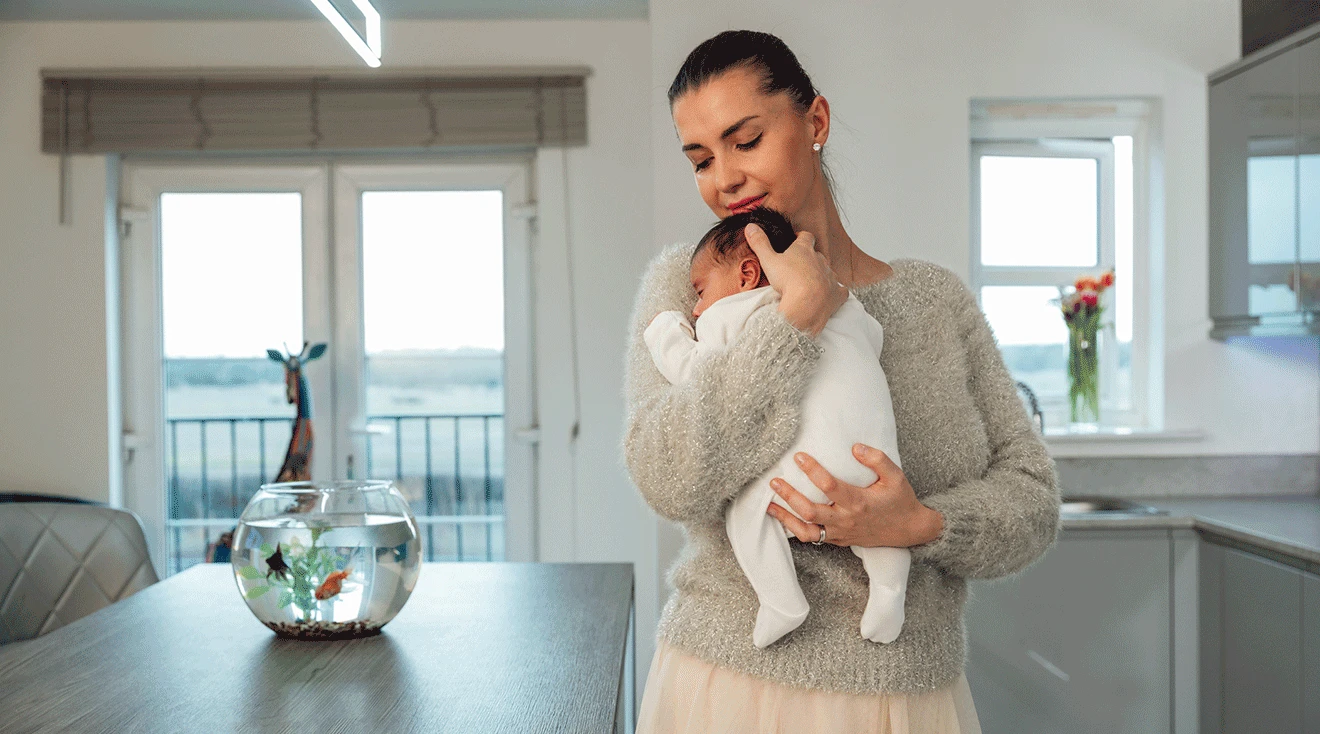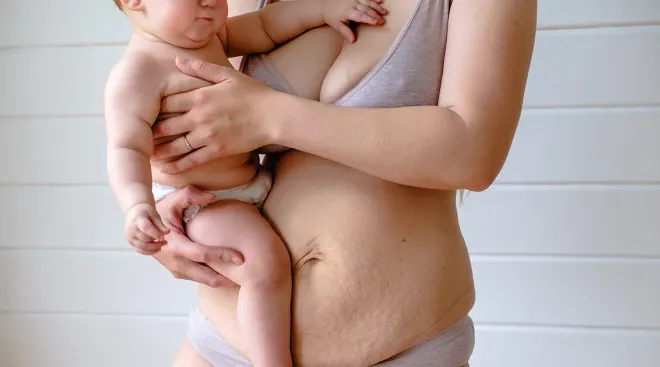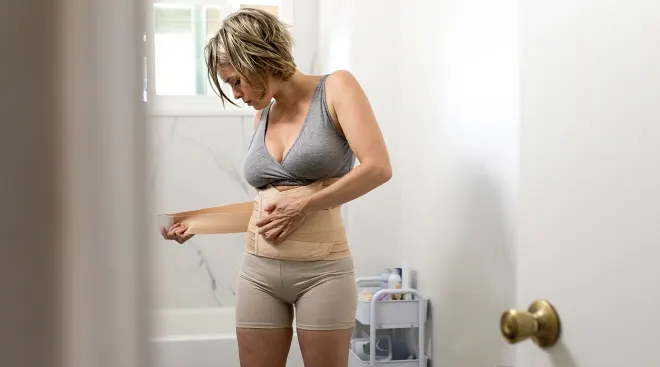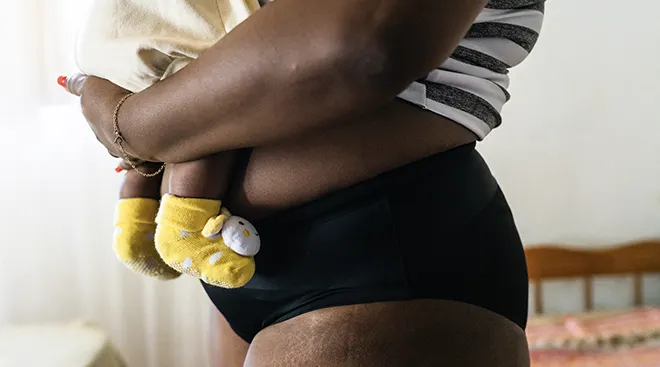What to Expect From Your First Period After Pregnancy
If you’ve just given birth, the first period after baby is probably the last thing you want to think about. After a nine-month break during pregnancy, and all that postpartum bleeding, who wants to sign up for their monthly cycle again?
But since it’s pretty much an inevitable event, it’s helpful to educate yourself on what to expect from your first period after birth. And remember: It’s totally possible to get pregnant after giving birth—including while breastfeeding—even if you haven’t yet had a period. Here’s everything you should know about your first period after pregnancy.
Many new moms and parents-to-be feel confused about the difference between postpartum bleeding (referred to as lochia) and a period. But here’s the distinction: lochia will occur immediately following baby’s birth, and it gets progressively lighter, says Cecilia Zhang, DO, an ob-gyn at Atlantic Health System.
Since the final stages of lochia can last up to six weeks after giving birth, it can sometimes be mistaken for that first postpartum period. But, in general, if you experience bright-red bleeding several weeks after giving birth and lochia has mostly stopped, it’s probably that first postpartum period. “Menstrual blood typically starts as deep red, bright, sometimes with clots, then turns dark and brown,” Zhang says.
There’s a large variation as to when your first period will return after childbirth, says Pamela Berens, MD, professor and ob-gyn with UTHealth Houston. “Much of this variation has to do with whether or not you’re breastfeeding. If you’re not breastfeeding, you can expect your period to return between six and eight weeks postpartum,” Berens says. Some women may have a period before this timeframe, while others could go as long as three months before they have a period after birth.
If you decide to exclusively breastfeed baby after birth—meaning you nurse around the clock and feed baby nothing except breast milk—you might get a slightly longer break before you have your first postpartum period. “Breastfeeding suppresses the hormones estrogen and progesterone, which are necessary for ovulation,” Berens says. “They work to keep the uterine lining thin, which can prevent your period from returning.”
That means you may not get a period for as long as six months after giving birth. But it’s important to understand that your chance of getting pregnant after six months increases even if your period hasn’t returned, Berens says. So if you aren’t hoping for another bundle of joy right away, you should use birth control every time you’re sexually active.
It’s also normal if your period returns a bit earlier even though you’re exclusively breastfeeding. There’s a great deal of variability from person to person when it comes to postpartum periods, says Berens.
Your first period after baby may be a bit heavier than you’re used to, but if you’re soaking a pad an hour, that wouldn’t be normal, Berens says. For the most part, your cycle should regulate pretty quickly after giving birth, even if that first period is slightly different. If you’re experiencing heavy bleeding, lots of pain or irregular periods after birth, it’s best to contact your doctor for a quick check to ensure everything is okay.
Berens reminds that if you have conditions that affect your menstrual cycle, such as uterine fibroids or polycystic ovarian syndrome, you may see a return of symptoms associated with those conditions once your menstrual cycle kicks in again.
Is your period different after baby?
If you had a normal menstrual cycle before you got pregnant, and didn’t have any gynecological health issues, then it’s pretty uncommon for your cycles to be substantially different after birth, Berens says. “Of course, slight changes can happen, but if you notice a dramatic change to your cycles after birth—irregular, heavier, more painful—you should talk with your healthcare provider,” says Berens.
How long does the first postpartum period last?
There’s a lot of variability when it comes to the length of your first postpartum period. Zhang says it should typically last under seven to 10 days. If it lasts longer, bring it up with your healthcare provider.
Can you use tampons for your first postpartum period?
Yes, you can resume use of tampons for your cycles—even for the first cycle after delivery, says Berens. Just make sure you’re first cleared at your six-week postpartum checkup. That’s when your doctor will ensure you’re healing properly with no signs of issues or infection. Prior to that time, it’s best to use pads for any bleeding you might have.
Frequently Asked Questions
When to expect your period after a chemical pregnancy or miscarriage?
Just like a full-term pregnancy, a miscarriage or a chemical pregnancy can mess with your menstrual cycle, at least temporarily. According to Zhang, most women will see a return of their period within three to six weeks, but that also depends on how regular you were before you experienced a miscarriage. Berens agrees that it’s often a quick disruption of your cycle, saying, “some women may ovulate as soon as a week or two after a miscarriage.”
Can you get pregnant again before your period returns?
Yes. Since you ovulate in the middle of your cycle before your period starts, you can get pregnant even if you haven’t yet had a period after giving birth. Many women incorrectly assume that as long as their period hasn’t returned, they can’t get pregnant—but that’s not the case. As soon as your doctor clears you to have sex after birth, it’s important to use birth control if you absolutely don’t want to risk getting pregnant again.
When do you start ovulating after pregnancy?
How soon you’ll ovulate after pregnancy is just as variable as when you can expect that first postpartum period. A big factor in when you’ll ovulate is whether you’re breastfeeding and how often, says Zhang. Again, exclusive breastfeeding can cause hormones that suppress ovulation longer than if you were formula-feeding.
Is it normal to have irregular periods after birth?
While some degree of irregularity can occur in the months after giving birth, in general, your period should quickly become pretty similar in nature and frequency as before you were pregnant. Therefore, says Berens, “if you have a sustained change to the regularity of your cycles after birth you should see your healthcare provider. If you had irregular cycles prior to birth, they may return to being irregular. If you needed a treatment to regulate your cycles (such as birth control pills) prior to your pregnancy, you may need to resume that treatment.”
Exactly when your first period after baby will happen can vary based on several factors, including how regular your cycle was before you got pregnant and whether you’re breastfeeding and how often. When your period finally returns after baby’s born, you may notice that it seems a bit different at first. But that shouldn’t last long: As the months pass, your period should return to the way it was before you got pregnant.
Please note: The Bump and the materials and information it contains are not intended to, and do not constitute, medical or other health advice or diagnosis and should not be used as such. You should always consult with a qualified physician or health professional about your specific circumstances.
Plus, more from The Bump:
Pamela Berens, MD, is a professor and ob-gyn with UTHealth Houston. She earned her medical degree from University of Minnesota Medical School.
Cecilia Zhang, DO, is an ob-gyn at Atlantic Health System. She earned her medical degree from the New York College of Osteopathic Medicine.
Learn how we ensure the accuracy of our content through our editorial and medical review process.
Navigate forward to interact with the calendar and select a date. Press the question mark key to get the keyboard shortcuts for changing dates.




















































